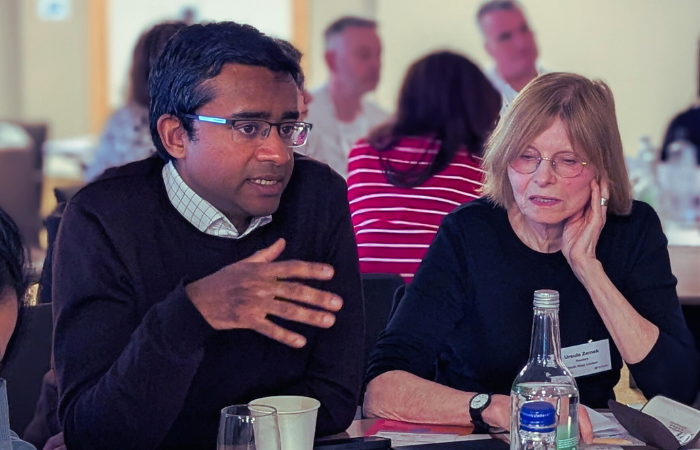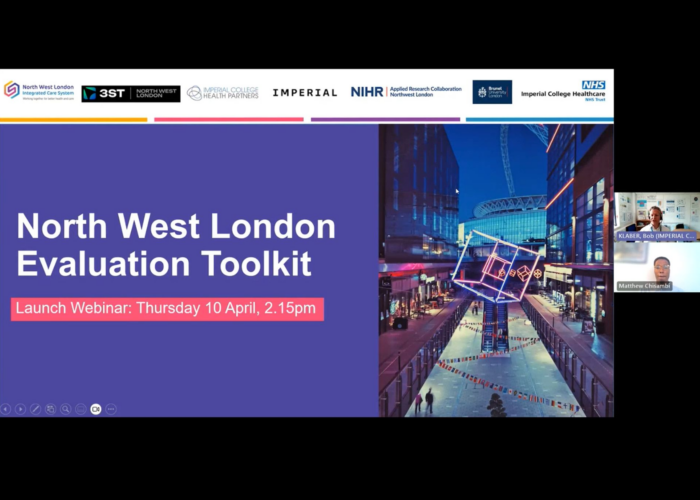Executive Director at ICHP, Amy Darlington, shares her reflections on her work collaborating with citizens through ICHP’s Deliberation and Engagement partnership with Ipsos UK, and how meaningful and high-quality Patient and Public Involvement and Engagement (PPIE) is informing trusted use of health and care data.

As someone who has worked in the NHS for most of my career, I have seen many iterations of the health service; from PCTs (Primary Care Trusts) to PCNs (Primary Care Networks), CCGs (Clinical Commissioning Groups) to ICBs (Integrated Care Boards). In the current environment, with growing waiting lists, workforce pressures, and economic downturn all threatening the quality of care, it is arguably one of the most challenging periods. However, with challenges come opportunities, and I remain hugely optimistic about the transformative role that better use of data in particular can play in improving the way healthcare is delivered in the future. But this ambition will only be realised if we allow the public to play a meaningful role in future change and transformation too.
One recent progressive step forward in health data use has been the creation of a network of Sub National Secure Data Environments (SNSDEs) for Research and Development (R&D), and we are proud to have supported the successful London bid alongside partners across the capital. But, as many of us who have been involved in the development of secure data environments previously, under the guise of Trusted Research Environments, have seen, to yield the vast benefits that SDEs can bring we must understand public expectations in relation to how their data is used, by whom and for what purpose – and we must understanding these expectations in the context of reality. How do the public weigh up risks and benefits when they are clear about the constraints that decision makers face – financial, technological etc. In my view, one of the most powerful and meaningful ways to do this is through a progressive form of engagement called deliberation.
Deliberation sees ‘mini publics’, reflective of a broader population, being convened over an extended period of time, informed on the topic/s in question through expert presentation and bespoke stimulus, and invited to explore and deliberate trade-offs associated with them. It has been used in a broad range of complex spaces, not just health, over recent years for example climate change, and can successfully help to shape public policy due to its ability to provide informed and considered public opinion.
This approach is particularly well-suited to delivering generating considered and informed public insights on topics like health care, and specifically health data, because it gives a framework and the space for a multitude of options to be explored and discussed collaboratively. The inclusive and educative approach to materials definition also makes topics people are unfamiliar with accessible, which ensures an inclusive approach to engagement and enables a diverse range of voices to come together to discuss and deliberate issues that directly affect them. And most importantly – people are only asked to deliberate things they can really influence.
At ICHP, we have built a Deliberation and Engagement partnership with Ipsos UK to provide health and care decision makers a means to involve citizens effectively in transformation. Through the partnership, we bring together leading expertise in public deliberation, dialogue and engagement with a deep knowledge of healthcare policy and experience in delivering complex change across health and care sector. Our partnership has delivered a series of deliberative engagements at ICS, regional and national levels. Much of our work has focused on acceptable use of health and care data, particularly in London. Through a series of deliberations, we have supported system leaders across London to gain a better understanding of public experiences and expectations to inform trusted policy, whilst in parallel building and maintaining trust between citizens and public bodies.
It has taken courage and ambition from system leaders to create the space for these more meaningful and useful dialogues on complex and controversial issues, and in London we are now reaping the benefits.
As such, we have a solid understanding of Londoners’ expectations around data use. These expectations have directly informed governance arrangements, access models, commercial principles and much more, as well as helped shape local and London-wide policy, thereby ensuring that we are using health and care data in a way that is both acceptable and trustworthy.
Deliberation does not wait until delivery of a project to get citizens’ opinions, but instead invites them into the process and allows them to play an active role in the design and delivery from the outset. It is a reciprocal and mutually beneficial relationship that is never ‘ended.’ And this is key: engagement is a conversation, not a certification. It cannot and should not be a one-off exercise. Instead, we should be seeking to build the necessary partnerships with our populations to engage with them effectively, and in an ongoing manner, and have the patience that doing both of these things properly requires. With each deliberative engagement activity we have supported, we have been able to build on the learnings of the last. They have not been one-off reports left to gather dust but have become trusted guidance supporting decision makers to deliver change and form policy with confidence.
Take the Discover-NOW Hub hosted by ICHP. How we established the Hub was directly informed by the OneLondon Citizen’s Summit held in February 2020, which set out Londoners’ expectations for using health and care data for research and development, and conditions for governance and oversight. In line with these public recommendations, the Discover-NOW Board made a commitment to establish a Citizens’ Advisory Group (CAG) to form part of the Hub’s governance structure, and to ensure meaningful input to decision-making and policy development. In turn, the CAG informed how decisions about data access are made, and by whom as well as what commercial principles should underpin how the Hub works with non-NHS partners in a trusted way. The outputs of which are captured in these two reports, released in March 2021 and May 2021.
Owing to this robust and progressive style of involvement, our industry and our NHS partners – and most importantly our population in North West London – can be confident that the use of data, and the controls that govern this, aligns to public expectations. And the public will one day benefit from the insights and outputs of the 145 (and growing) data access applications for research into the prevention and treatment of diseases like Type 2 Diabetes, Heart Failure and Chronic Kidney Disease.
Engaging the public in policy formation helps to build trust and confidence in the decisions made, which will help us to develop new innovations and ways of working more effectively, more sustainably and more confidently, implemented in the NHS. It has taken courage and ambition from system leaders to create the space for these more meaningful and useful dialogues on complex and controversial issues, and in London we are now reaping the benefits. I am excited to see how continued partnership working with our populations to design the policies and principles that underpin data use, support the success of SNSDEs at a regional and national level.
Our top tips for robust patient and public involvement:
Start with the public. In all of this work, our public engagement strategy really has started at the beginning. This means we have been able to develop our approach proactively rather than reactively, gaining the support of key stakeholders from the outset.
Give patients and the public tangible options. Engagement where citizens can not actually affect change fuels the perception that involvement is tokenistic. Transparency, openness and being honest about what can be influenced, and what can’t, is key to building trusting relationships.
Make sure all opinions are heard. The Discover-NOW CAG reflects the rich diversity of our local population, and across our work we’re proactive in inviting challenging perspectives and engaging seldom heard groups. This diversity of experience and opinion adds to the robustness of the outputs.
Build networks and partnerships. As well as our Ipsos UK partnership, we have worked with third sector and community groups to make sure all voices are represented in our engagement activities.
Be patient. We know these things take patience (and funding), but if they are to be done well, they must be done properly. Evidence now shows that meaningfully engaging the public in these complex areas, and genuinely inviting them to work in partnership to shape the future, whilst taking time, ultimately means we can go further, faster.
If you would like to learn more about our Patient and Public Involvement and Engagement work, email sadie.myhill@imperialcollegehealthpartners.com.



